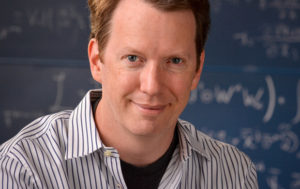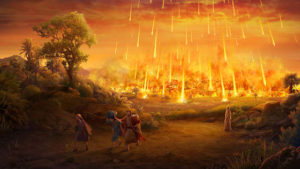Physicist Sean Carroll An article at American Thinker about conspiracy theories and the moon landing caught my attention when the term vincible ignorance was introduced and defined as the "stubborn resistance to the truth and refusal to accept it, no matter how overwhelming the evidence in its favor is." Coined with the intention of being applied to various positions on Catholic dogma, the terminology has useful application in a more secular context. Invincible ignorance has been defined as an unknown that can never be known. A secular example of invincible ignorance might be the conditions that existed prior to the Big Bang singularity--we "know" the universe had an origin because we've been told evidence for the Big Bang exists, called redshift and cosmic microwave background radiation (CMB). The consensus of physicists (although consensus is not science) is that a very small, highly condensed dot of material rapidly expanded to become this universe. We don't know what existed prior to the Big Bang. We can only guess and speculate. It would be an example of vincible ignorance to know about redshift and CMB evidence and still reject the Big Bang evidence in favor of the steady state (eternal, unchanging universe) hypothesis. While similar to the phrase I began using a while ago, the subtle difference between vincible ignorance and willful ignorance is knowing and rejecting the truth as opposed to simply avoiding it. The distinction appears to be useful, to be sure. For example several years ago, while participating on an internet panel to discuss his … [Read more...]
Historical Sodom and Gomorrah
For the past decade or so, I've wasted numerous hours of my life engaged in ultimately futile conversations about theology on social media. It seems that I have some sort of natural talent for annoying people at both ends of the spectrum. The outspoken atheists and anti-theists on the internet don't appreciate my confidence and use of logic, reason, and scientific evidence to support my argument in favor of a supernatural creator God. There are also some theists who believe the Bible is literally flawless, or inerrant, and don't like some of the articles I've written expressing my opinions (and research) on that subject. The cliche says you can't please all of the people all of the time, but sometimes it seems like I can't please anybody, anytime. So maybe it's a good thing that pleasing other people isn't a very high priority for me. Frankly, I care a lot more about truth than I'm worried about whether or not you like my writing. No offense meant, but the truth matters more than your feelings. If you like my writing, great. If not, please find something else to read. Different strokes for different folks. My feelings won't be hurt. Quid est veritas? What is truth? To this day, that remains one of the best questions ever asked. Theists who would argue the Bible is inerrant (mistake-free) should think about how they might respond when a knowledgeable atheist points out that Genesis 1 and Genesis 2 provide two different accounts of creation, or could argue that the story of Abraham and Isaac found in Genesis 22 indicates that at times, God appears to be cruel … [Read more...]
A Universe from Nothing
Not long ago I was having a conversation with an atheist acquaintance on social media about the origin of the universe and my friend suggested "nobody" believes there was ever a time when literally nothing existed. Naturally, my response was something along the lines of "Oh, really?" and I posted the Amazon link to physicist Lawrence Krauss' book A Universe From Nothing, the title of which would seem to refute his claim. photo by REUTERS/Leah Millis Curiously, he asked if I'd read the book (as if I'm in the habit of recommending books I didn't write nor haven't read). I didn't bother explaining that I'd first read the book approximately six years ago and had written a review published as the Atlanta Creationism Examiner for the now-defunct Examiner.com website. I briefly entertained the idea of simply republishing the original article here at my website, but that review seemed dated, so I decided not to re-post it. Then, out of the blue, another atheist acquaintance in yet another "discussion" forum posted the link to another six-year-old review of Krauss' book by David Albert, returning it to the forefront of my mind. Which brings us here. Technically speaking, my atheist friend's argument had been correct in the sense that physicists and cosmologists have explained prior to the creation of our universe, time did not exist because it had no means to measure it, given that our measurements for time are exclusively defined by the universe. Thomas Aquinas famously suggested that our universe began with time, not in time. God created the universe literally ex … [Read more...]
Iran’s influence on a global scale
I don't normally provide opportunities for other writers to post material at my blog for a number of reasons. There is the quality control issue--the guest writer must have a talent for writing as well as something to say worth reading. Not to mention (except I am) it takes a bit of effort on my part to screen, edit, format, and publish the work of someone else and I'm a bit lazy by nature. Also, I would be spending time that could be devoted to my own writing or editing, versus to the work of a total stranger, so I don't normally invite or encourage guest bloggers to submit articles for review. On the other hand, when I make an exception and post a guest blog such as this one, I'm giving that writer's effort my endorsement by publishing their work and strongly recommending you read it. About the Author: Avi Kumar grew up in Sri Lanka. As a member of the Tamil minority, he has a unique perspective when it comes to growing up in a war zone. From an early age in order to survive, he learned to remain silent about controversial issues when it wasn't safe to speak about them. Avi has lived in five different countries and speaks ten different languages. Fortunately, one of his ten languages is English, or I wouldn't have had the slightest idea what I was reading. Avi loves wildlife photography and writing about religious and political issues with his unique conservative perspective. Iran’s global influence and threat level keep growing, While Iran may not be an economic powerhouse like Saudi Arabia, Israel or the … [Read more...]
Calling the wrong guy stupid
Dr. Laurence Moran Laurence A. "Larry" Moran (and no, it's not really Moron) is apparently a pretty smart guy. He holds a PhD in biochemistry from Princeton University and served as a college professor for decades at the University of Toronto. He's probably best known for being one of the lead authors of a textbook called Principles of Biochemistry, although in fairness, his personal blog called Sandwalk also attracts a fair amount of internet traffic, which is how I learned about Dr. Moran--ironically enough, while searching the internet for information on Dr. James Tour. What has inspired me to write about my limited knowledge of Dr. Moran was the conclusion to his article harshly critical of Dr. Tour: I suppose I'm going to be labeled as one of those evil "Darwinists" who won't tolerate anyone who disagrees with me about evolution. I'm actually not. I just don't like stupid people who think they are experts in evolution when they have never bothered to learn about it. Here's my advice to graduate students in organic chemistry: if you want to know about evolution then take a course or read a textbook. And remember, there's nothing wrong with admitting that you don't understand a subject. Just don't assume your own ignorance means that all the experts in the subject are wrong too. [emphasis added]Laurence A. Moran, "A chemist who doesn't understand evolution" Wow. If I'm not mistaken, Dr. Moran just described Dr. Tour as being a stupid person. So I'm wondering, is it possible that a chemistry professor wouldn't know who Dr. Tour is? How could he not know? … [Read more...]





